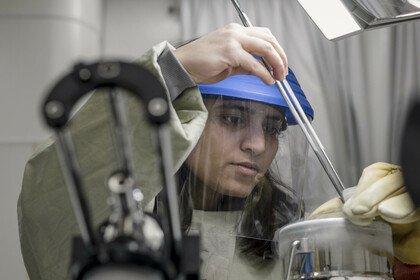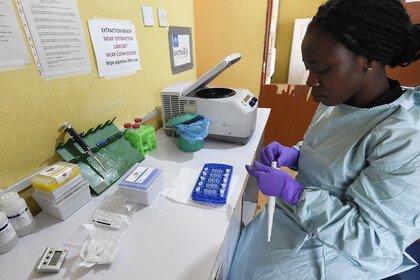
Wellcome's vision and strategy
Wellcome supports science to solve the urgent health challenges facing everyone.
Science is essential to solving the world’s health challenges. That’s Wellcome's founding principle and it’s as true today as ever. It’s why we will always support bold research across a wide range of disciplines to discover more about life, health, and wellbeing.
In order to achieve our mission and take on the most urgent health issues, we support the scientific community so they can continue to make vital progress.
We do this by funding discovery research over a broad range of disciplines – including social sciences and the humanities – giving researchers the freedom to explore life, health, and wellbeing and seek insights that can inspire future improvements in health.
And we bring together expertise across science, innovation, and society to develop solutions to address the issues of three urgent health challenges: mental health, infectious diseases, and climate and health.
But funding science alone isn’t enough.
We partner with key decision makers in governments, businesses, and other organisations to ensure that scientific evidence remains at the heart of health policy.
Why are we focusing on three health challenges?
Today, three global health problems threaten to undermine our efforts to improve health for decades to come – the effects of mental health issues, escalating infectious diseases, and climate change.
These issues limit life for people of all ages in all parts of the world and can devastate communities for generations.
We’re making significant commitments to supporting research towards equitable and accessible solutions.
What do we want to achieve?
Mental health
We want to transform the ability to intervene as early as possible in mental health problems that affect the most people – and include the most disabling conditions.
The mental health programme seeks to:
- gain a better understanding of how the brain, body, and environment interact in depression, anxiety, and psychosis so that we can spot potential points for early intervention
- find better ways of identifying and grouping people with – or at risk of – these conditions so that we can provide more timely and personalised interventions
- find new and improved ways of intervening. This could involve things that an individual does for themselves, are provided by a healthcare professional, or are provided by policies or practices in wider society.
Climate and health
We aim to put health at the heart of climate action.
The climate and health programme aims to support:
- a transformational advance in the availability, access and use of research and evidence on the direct and indirect effects on health of climate change at local, national, regional, and global levels
- a transformational advance in the availability, access and use of climate change mitigation actions that have a disproportionately positive benefit to health
- a transformational advance in the availability, access and use of mitigation-pathway-dependent climate change adaptations to protect health in vulnerable communities
- the development of a global Climate and Health research, policy, and practice community that requests and uses evidence to inform policy and drive urgent actions.
Infectious disease
Our work will focus on achieving the long-term outcome of a ‘reduced risk and impact of infectious diseases’ by targeting the factors leading to escalation.
The infectious programme seeks to:
- gain a greater understanding of the mechanisms underlying the sources and drivers of infectious diseases
- drive a paradigm shift from reacting to current infectious diseases to a predictive and preventative approach
- create a new generation of affordable products and tools, and facilitate their implementation and hence their impact.
Discovery research
Discovery research is our term for research that aims to transform the way we understand life, health, and wellbeing, with a view to improving health.
We fund projects from a range of disciplines – from physical and social sciences to the humanities – to uncover knowledge that may underpin the solutions to our three urgent health challenges in the future.
The discovery research programme seeks to support:
- creative, ambitious, high quality, and transformative discovery research
- catalytic environments for research through investment in tools, technologies, methodologies, and enabling platforms that open up new fields of enquiry and transform existing fields
- a diversity of people, places and approaches to generate new perspectives and insights.
We have three discovery research schemes available and encourage researchers at all stages of their career to apply.

